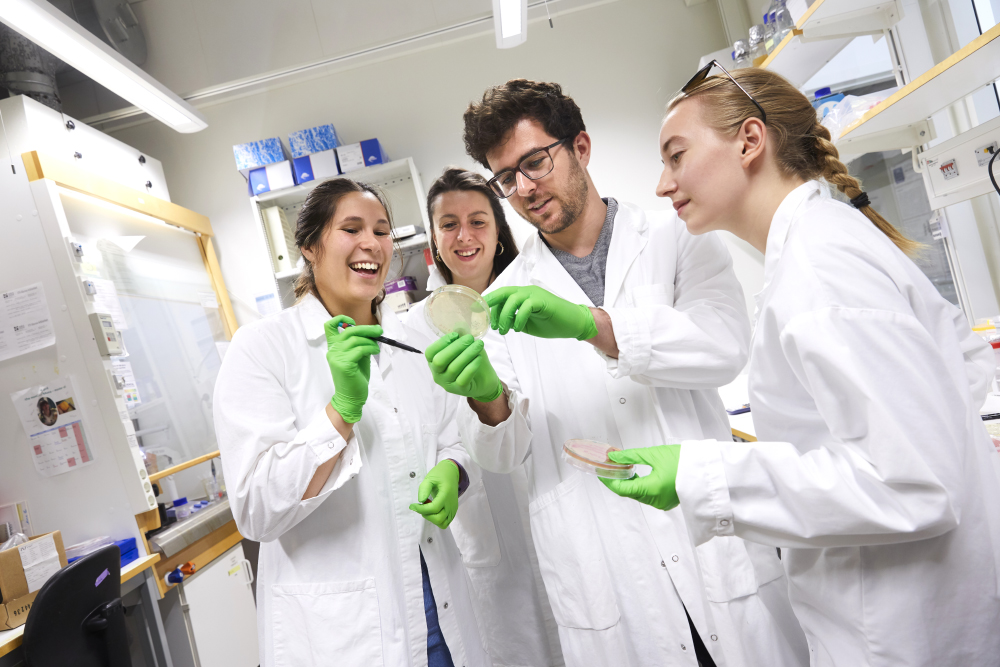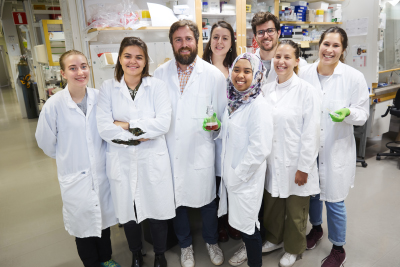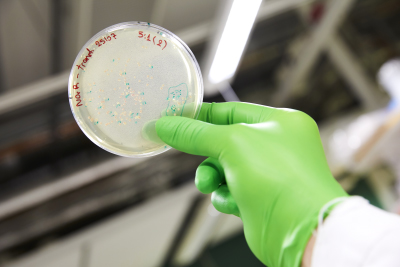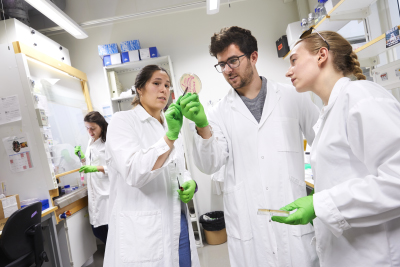Student team competing in Boston
– with a solution that increases the efficiency of an alternative to antibiotic treatment
A team of students from KTH Royal Institute of Technology in Stockholm, the Karolinska Institute (KI), Stockholm University and Beckmans College of Design has just finished their part in iGEM, an international competition in synthetic biology at Massachusetts Institute of Technology (MIT) in Boston. The team’s competition entry is a solution that increases the efficiency of alternative treatment methods when the use of antibiotics does not help.

Antibiotic resistance is a major health problem around the world. Infections caused by antibiotic-resistant bacteria lead to around 500,000 deaths every year. It is estimated that by year 2050, 10 million people will have died from antibiotic-resistant infections.

This is something that team IGEM Stockholm – consisting of students from four different universities in Stockholm – wants to do something about. The team has developed a genetic switch that results in a more effective phage therapy , an alternative treatment when using antibiotics does not help.
Phage therapy is a treatment method using phages (also known as bacteriophages) which are viruses that kill pathogens, i.e. harmful bacterial infections. Phage therapy is typically administered orally or by injection into the bloodstream of the patient. The therapy can be used to treat infections caused by multi-resistant bacteria.

Transports phages to the site of infection
The main issue with today’s phage therapy is that only a fraction of the phages reach the infection site as a result of which, the bad bacteria is left untreated. The solution developed by IGEM Stockholm consists of a phage activating genetic switch. A harmless bacterium is used to transport the inactive phage to the site of the infection. Once there the transport bacterium comes into contact with the intestinal infection, the genetic switch triggers the activation of the phage.
“The phage starts to multiply inside the transport bacterium until eventually, it explodes. As a result, a high dose of functional phages are released around the antibiotic-resistant bacteria”, one of the team members, Rebecca de Sousa, student at the Karolinska Institute, says.

Raising awareness about the project is an important part of the competition
The team has called their project Esther, after the researcher Esther Lederberg who discovered the so-called lambda phage. They are presenting their project at the Massachusetts Institute of Technology (MIT) in Boston in conjunction with the iGEM (International Genetically Engineered Machine) International Competition in Synthetic Biology 31 October – 4 November. The competition brings together teams from all over the world with students working together to find new solutions in different areas such as the environment, diagnostics and new analytical methods.
However, iGEM is not just about new technical solutions being presented by individual teams. It is just as much about the presentation itself and the extent to which the solution impacts on society. Raising public awareness about the team’s project, referred to in the competition as ‘human practice’, is also very important.
In fact, when it comes to ‘human practices’, the IGEM Stockholm team is looking very strong. Team activities include setting up an art exhibition at the old reactor hall R1 at KTH Royal Institute of Technology in Stockholm, producing a card game and inviting secondary school students to the laboratory . Last September, the project featured on the Swedish TV4 television network when some of the team members were also interviewed.
“Another example is the SynthEthics Project which we hope will lead to the development of ethical guidelines for legislation on synthetic biology in collaboration with iGEM Lund, iGEM Wroclaw and students from around the world. During the iGEM Vilnius BioHackathon, a 48 hours’ long hackathon in Lithuania, we also developed our own website for genetic design”, another team member, Stella Axelsson, who studies biotechnology at the Royal Institute of Technology in Stockholm, says.
17 members from four universities and 13 countries
The fact that IGEM Stockholm is made up of 17 members from four different educational institutions studying a variety of subjects (biotechnology, medicine, art, etc.) also brings strength to the team. The team members are organised in sub-teams – economy, media, design, human practice, wet lab and dry lab – with each sub-team contributing greatly to the team as a whole. Another strength, which has made working with the project extra exciting, is that the members of the team come from 13 different countries. During a break in the project, an international dinner was organised with everyone in the team bringing a dish from their native country.
“It was a fantastic evening”, Stella Axelsson says.
The iGEM 2019 competition was 31 October – 4 November. Check out the IGEM Stockholm team on Facebook and Instagram and also on the KTH Alumni Instagram , which will be managed by the team this week.
For more information about the project, please send an e-mail to Nerea Capon, Project Manager, at nereacaponl@gmail.com.
Håkan Soold

